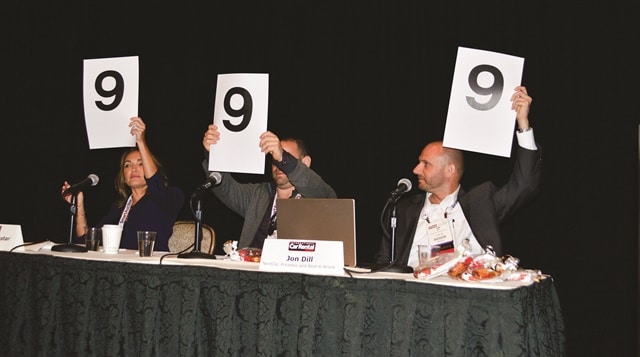- Car Rental Software, Uncategorized
- July 13, 2016
Anatomy of a Customer Call

In today’s rental process, a customer’s experience still often starts with the initial phone call. It can set the tone for a car rental company’s customer service, the revenue for the rental, and whether the customer will return.
What are the components of good (and bad) calls?
A panel seminar at the 2016 International Car Rental Show shed light on the answer by analyzing actual rental agent calls with customers, with the goal of giving attendees and their staffs the tools to improve their phone skills — to book the reservation and win a repeat customer.
The calls were evaluated by Jason Manelli, vice president of marketing forInternational Franchise Systems (IFS), the franchisor and corporate parent of the Rent-A-Wreck, Priceless, and Nextcar rental brands; Jon Dill, contact center director of IFS; Ian Kusinitz, owner of Empire Rent A Car; and Doris Morningstar, senior media consultant at Hibu, an online marketing agency.
Here is a compendium of their assessments and recommendations.
Good Calls
- A positive tone sets the stage.
A rental agent’s tone can make or break a call. A pleasant and enthusiastic tone communicates a positive attitude to customers, fosters engagement, and builds a relationship. This should go without saying, but its importance is often overlooked. Based on tone, a customer can tell whether an agent is willing to help, the panelists said.
After listening to a call, Dill pointed out how the agent kept the conversation on a positive note with wording like “How does that sound to you?”
“She wanted to be talking to the customer, and you could hear it in the tone of her voice,” said Dill.
Remember, a customer can hear a smile over the phone. “Tone is an underappreciated and a nuanced thing to manage and train,” said Manelli.
- Identifying repeat customers enables higher sales.
Asking if the caller is a repeat customer can help make the sale easier. According to Kusinitz, identifying repeat customers allows agents to pull up their rental history to gauge how much they’d be willing to spend for the next rental. If the customer upgraded previously, remember to present upgrade opportunities this time, said Kusinitz.
After asking if the caller is a repeat customer, it’s important to acknowledge his or her loyalty to the company. In one of the calls, the panelists praised the agent who said “welcome back” when the caller indicated that she had rented there before.
Morningstar recommends thanking repeat customers for their business. “It’s hard to get a new client, so make sure you keep your previous clients loyal to you,” she said.
- Mentioning specials incentivizes immediate (and possibly longer) bookings.
Bringing up discounts or specials encourages the renter to book now. If the caller wants the vehicle for more than a few days, mentioning a weekly special could incentivize a longer rental. “With that class, we have a weekly special with unlimited mileage. How does that sound?”
“She mentioned the weekly special and had the total added up instead of giving the daily rate,” said Morningstar.
When the agent gives a total price for the week instead of breaking it down by the day, it helps to put the customer in those terms.
- Inquiring about new reservations leads to new business.
“Do you have any additional questions or any other future reservations for me?” asked an agent in one of the calls.
Morningstar liked that the agent was thinking ahead to try to get another sale. “I don’t hear this in many calls,” she said, adding that this gets the caller thinking about upcoming plans. “The agent might as well book the reservation then and there and plan ahead.”
Phone Call Don’ts
- Rushing the customer erodes established goodwill.
At the beginning of a call, an agent laughed at the caller when she mentioned that she needed a car within an hour or two.
“That’s not a good way to develop a relationship with the customer,” said Dill. “The agent was rude by laughing at the customer.”
In the same call, the agent rushed the caller when she was trying to look up her insurance information, peppering her with questions while she looked for her insurance policy.
Once the caller found her insurance policy number, the agent interrupted her and told her to just bring the information when she came into the office.
- Waiting on getting the caller’s number risks losing the reservation.
During one of the recorded calls, the agent not only didn’t book a reservation over the phone but he also never asked for the caller’s name or number. He just told the caller to come into the office.
Caller: “I’ll be there in about 40 minutes.”
Agent: “OK. See you in a bit.”
What if the customer never showed up? If the agent doesn’t have a contact number, he or she can’t call to confirm that the potential customer is going to come in and book the reservation.
Additionally, if an agent gets the caller’s name at the beginning, he or she can use the name throughout the conversation.
“From the research that I’ve done, using someone’s name three times in a conversation really helps to build rapport,” said Morningstar.
- Handling the phone sale and the counter customer is a disservice to both.
Answering phone calls while helping customers at the counter is too distracting, our panelists said, because agents can’t give their full attention to both customers at the same time.
“It becomes problematic,” said Kusinitz, explaining that the customer at the counter is today’s business, while the person on the phone represents future business. “You can’t be doing both at the same time.”
During a call, the agent was preoccupied with helping a person at the counter when she answered the phone. She ended up losing the sale on the phone.
This reinforces the need for the agent to get the caller’s number. If it gets busy at the counter, “The agent then says, ‘I have a customer at the counter right now and I would love to give both of you 100% of my attention. Can I give you a call back?’” said an audience member during the seminar.
“That way, both customers hear that they are important to the company. The agents end up getting the sale because they called the customer back.”
- Don’t muddy the sales pitch by giving too much information.
During a call, the agent overly explained the deposit requirements. “The agent gave the customer too much information,” said Dill. “The deposit requirement is your company’s policy and you don’t have to explain every detail.”
Dill also commented on how an agent provided too much qualifying information before discussing the rate. The agent wasn’t selling the customer; the customer only wanted to know specific details like the price, the number of miles included, and the benefits and features of the vehicle.
“The agent needs to paint the experience for the customer,” said Dill. “The customer only knows what we tell them. When they call the next company and they explain it better, the customer will probably book with them.”
Source: Auto Rental News



